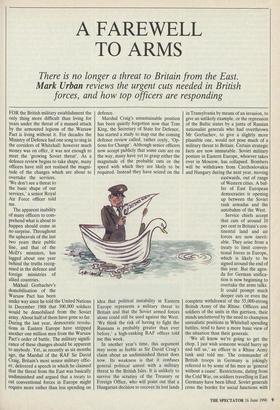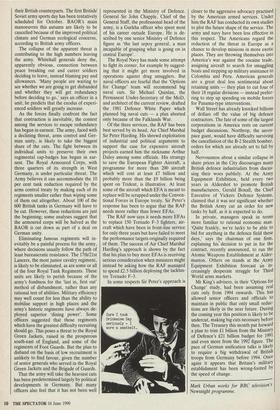A FAREWELL TO ARMS
There is no longer a threat to Britain from the East.
Mark Urban reviews the urgent cuts needed in British
forces, and how top officers are responding
FOR the British military establishment the only thing more difficult than living for years under the threat of a massed attack by the armoured legions of the Warsaw Pact is living without it. For decades the Ministry of Defence had one song to sing in the corridors of Whitehall: however much money was on offer, it was not enough to meet the 'growing Soviet threat'. As a defence review begins to take shape, many officers have still not realised the magni- tude of the changes which are about to overtake the services. `We don't see a threat to the basic shape of our services,' a senior Royal Air Force officer told me.
The apparent inability of many officers to com- prehend what is about to happen should come as no surprise. Throughout the upheavals of the last two years their public line, and that of the MoD's ministers, has lagged about one year behind the truths recog- nised in the defence and foreign ministries of allied countries.
Mikhail Gorbachev's demobilisation of the Warsaw Pact has been under way since he told the United Nations in December 1988 that 500,000 soldiers would be demobilised from the Soviet army. About half of them have gone so far. During the last year, democratic revolu- tions in Eastern Europe have stripped another one million men from the Warsaw Pact's order of battle. The military signifi- cance of these changes should be apparent to anybody. Yet, as.recently as six months ago, the Marshal of the RAF Sir David Craig, Britain's most senior military offic- er, delivered a speech in which he claimed that the threat from the East was basically undiminished and argued that a treaty to cut conventional forces in Europe might require more rather than less spending on defence.
Marshal Craig's unsustainable position has been quietly forgotten now that Tom King, the Secretary of State for Defence, has started a study to map out the coming defence review called, rather coyly, 'Op- tions for Change'. Although senior officers now accept publicly that some cuts are on the way, many have yet to grasp either the magnitude of the probable cuts or the speed with which they are likely to be required. Instead they have seized on the idea that political instability in Eastern Europe represents a military threat to Britain and that the Soviet armed forces alone could still be used against the West. `We think the risk of having to fight the Russians is probably greater than ever before,' a high-ranking RAF officer told me this week.
In another year's time, this argument may seem as feeble as Sir David Craig's claim about an undiminished threat does now. Its weakness is that it confuses general political unrest with a military threat to the British Isles. It is unlikely to survive the scrutiny of the Treasury or Foreign Office, who will point out that a Hungarian decision to recover its lost lands in Transylvania by means of an invasion, to give an unlikely example, or the repression of the Baltic states by a junta of Russian nationalist generals who had overthrown Mr Gorbachev, to give a slightly more plausible one, would not pose much of a military threat to Britain. Certain strategic facts are now immutable. Soviet military posture in Eastern Europe, whoever takes over in Moscow, has collapsed. Bombers will be withdrawn from Czechoslovakia and Hungary during the next year, moving eastwards, out of range of Western cities. A buf- fer of East European democracies is opening up between the Soviet tank armadas and the autobahns of the West.
`We all know we're going to get the chop, I just wish someone would hurry up and tell us,' an officer in a Rhine Army tank unit told me. The commander of British troops in Germany is jokingly referred to by some of his men as 'general without a cause'. Restrictions, dating from the Cold War, on soldiers travelling in East Germany have been lifted. Soviet generals cross the border for social functions with their British counterparts. The first British/ Soviet army sports day has been tentatively scheduled for October. BAOR's main manoeuvres this autumn are likely to be cancelled because of the improved political climate and German ecological concerns, according to British army officers.
The collapse of the apparent threat is contributing to the high numbers leaving the army. Whitehall generals deny the, apparently obvious, connection between peace breaking out and career soldiers deciding to leave, instead blaming pay and allowances. 'Many people are waiting to see whether we are going to get disbanded and whether they will get redundancy before deciding to go,' says an officer in a unit; he predicts that the exodus of experi- enced soldiers will greatly increase.
As the forces finally confront the fact that contraction is inevitable, the contest among the services to escape redundancy has begun in earnest. The army, faced with a declining threat, arms control and Ger- man unity, is likely to take the biggest share of the cuts. The fight between its individual units to preserve their own regimental cap-badges has begun in ear- nest. The Royal Armoured Corps, with three quarters of its strength in West Germany, is under particular threat. The Army believes it can accommodate the 10 per cent tank reduction required by the arms control treaty by making each of its regiments smaller rather than wiping some of them out altogether. About 100 of the 600 British tanks in Germany will have to be cut. However, these reductions are just the beginning; some analyses suggest that the armoured corps will be halved as the BAOR is cut down as part of a deal on German unity.
Eliminating famous regiments will in- evitably be a painful process for the army, where decisions usually follow the path of least bureaucratic resistance. The 17th/21st Lancers, the most junior cavalry regiment, is likely to be eliminated, as are some or all of the four Royal Tank Regiments. These units are likely to perish because of the army's fondness for the 'last in, first out' method of disbandment, rather than any rational test of abilities. Military efficiency may well count for less than the ability to mobilise support in high places and the army's historic regiments have always de- ployed superior 'dining power'. Some officers suggested that those regiments which have the greatest difficulty recruiting should go. This poses a threat to the Royal Green Jackets, raised in the prosperous south-east of England, and some of the regiments of Foot Guards. But the plan to disband on the basis of low recruitment is unlikely to find favour, given the number of senior generals who served in the Royal Green Jackets and the Brigade of Guards.
That the army will take the heaviest cuts has been predetermined largely by political developments in Germany. But many officers also feel that it has not been well represented in the Ministry of Defence. General Sir John Chapple, Chief of the General Staff, the professional head of the army, is a Gurkha officer who spent most of his career outside Europe. He is de- scribed by one senior Ministry of Defence figure as 'the last sepoy general, a man incapable of grasping what is going on in central Europe'.
The Royal Navy has made some attempt to fight its corner, for example by suggest- ing that it might get more involved in operations against drug smugglers. But naval officers are fearful that the 'Options for Change' team will recommend big naval cuts. Sir Michael Quinlan, the Permanent Under-Secretary of the MoD, and architect of the current review, drafted the 1981 Defence White Paper which planned big naval cuts — a plan aborted only because of the Falklands War.
Of the three services, the RAF has been best served by its head, Air Chief Marshal Sir Peter Harding. His shrewd exploitation of industrial and political arguments to support the case for expensive aircraft projects earned him the nickname Arthur Daley among some officials. His strategy to save the European Fighter Aircraft, a programme for more than 200 aircraft which will cost at least £7 billion and probably more than the £9 billion being spent on Trident, is illustrative. At least some of the aircraft which EFA is meant to replace will be scrapped under the Conven- tional Forces in Europe treaty. Sir Peter's response has been to argue that the RAF needs more rather than fewer EFAs.
The RAF now says it needs more EFAs to replace 150 Tornado F-3 fighters, air- craft which have been in front-line service for only three years but have failed to meet the performance targets originally required of them. The success of Air Chief Marshal Harding's approach is shown by the fact that his plan to buy more EFAs is receiving serious consideration when ministers might instead be asking how the RAF managed to spend £2.5 billion deploying the lacklus- tre Tornado F-3.
In some respects Sir Peter's approach is closer to the aggressive advocacy practised by the American armed services. Under him the RAF has conducted its own studies to plot the future shape of the service. The army and navy have been less effective in this respect. The Americans regard the reduction of the threat in Europe as a chance to develop missions in more exotic places. They are throwing themselves into America's war against the cocaine trade, assigning aircraft to search for smuggling boats and stepping up military assistance to Colombia and Peru. American generals are a great deal less sentimental about retaining units — they plan to cut four of their 18 regular divisions — instead prefer- ring to step up spending on mobile forces for Panama-type interventions.
Wall Street has already knocked billions of dollars off the value of big defence contractors. The fate of some of the largest corporations in America rests on current budget discussions. Northrop, the aeros- pace giant, would have difficulty surviving the cancellation of the B-2 Stealth bomber, orders for which are already set to fall by half.
Nervousness about a similar collapse in share prices in the City discourages many British defence industrialists from discus- sing their woes publicly. At the Army Equipment Exhibition, held every two years in Aldershot to promote British manufacturers, Gerald Boxall, the Chief Executive of Vickers Defence Systems, claimed that it was not significant whether the British Army cut an order for new tanks by half, as it is expected to do.
In private, managers speak in terms more familiar to rational economic man. `Quite frankly, we're lucky to be able to bid for anything in the defence field these days,' says the chairman of one firm, explaining his decision to put in for the contract, recently announced, to run the Atomic Weapons Establishment at Alder- maston. Others on stands at the Army Equipment Exhibition forecast an in- creasingly desperate struggle for Third World arms markets.
Mr King's advisers, in their 'Options for Change' study, had been assuming real cuts only from 1994 onwards. This has allowed senior officers and officials to maintain in public that only small reduc- tions are likely in the near future. During the coming year this position is likely to be undercut, making big cuts necessary before then. The Treasury this month put forward a plan to trim £1 billion from the Ministry of Defence's £21 billion budget for 1991 and even more from the 1992 figure. The pace of German unification talks is likely to require a big withdrawal of British troops from Germany before 1994. Once again it appears that Britain's military establishment has been wrong-footed by the speed of change.
Mark Urban works for BBC television's Newsnight programme.



















































 Previous page
Previous page